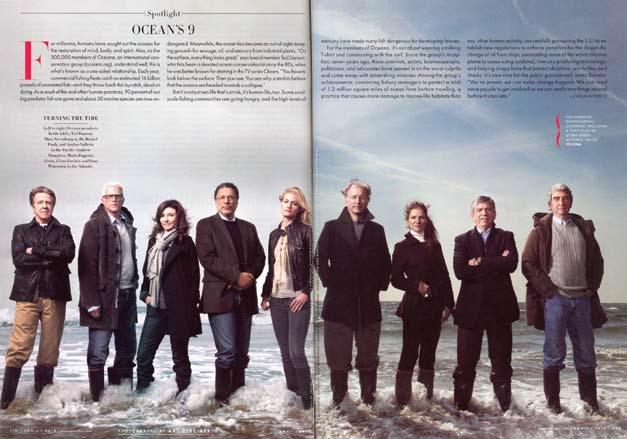
3 minute read
Press
In 2008, thousands of news stories about Oceana appeared in major daily newspapers and magazines, as well as in television and radio broadcasts, helping Oceana gain credibility and support around the world.
Oceana was featured in Vanity Fair’s Green Issue, May 2008.
NORTH AMERICA
In what was perhaps Oceana’s biggest magazine press hit to date, a full page photo spread appeared in the May 2008 issue of Vanity Fair. The piece summarized Oceana’s work and pictured members of the Oceana Board of Directors, including chairman Keith Addis, Ted Danson and Sam Waterston.
In mid-January, Oceana released a report entitled “Hold the Mercury,” which summarized the test results of nearly 100 samples of fresh fish and sushi from stores and restaurants in 26 U.S. cities. The report generated nearly 700 stories, including prominent mentions on the websites of The New York Times and Newsweek.
On June 8, World Oceans Day, Oceana CEO Andy Sharpless appeared on NBC’s Today Show to discuss the state of the world’s oceans.
In July, the Associated Press covered Oceana’s successful effort to secure closure of 180,000 square miles of the Bering Sea to destructive bottom trawling. The article quoted multiple Oceana staff members on the importance of the historic closure and was picked up by around 100 news outlets, including most of the major newspapers on the U.S. Pacific coast.
In addition, Oceana was one of only four non-profit organizations to be selected by Food & Wine magazine in the August issue for its annual Eco-Ocean Award. The magazine described Oceana’s success in pressuring Congress to pass two resolutions supporting the elimination of destructive fishing subsidies.
On October 18, the Oceana Partners Award Gala attracted a lot of media attention, including the entertainment programs Access Hollywood, E!, Extra, Insider TV and TV Guide.
EuROpE
In Europe, Oceana received a substantial amount of media attention for its bluefin tuna, shark and destructive trawling campaigns.
During the Oceana Ranger’s 2008 summer expedition off the north coast of Spain, many European outlets covered the team’s habitat protection research. Oceana was also able to react immediately to an oil spill in the Strait of Gibraltar, which attracted significant media attention, including from major news wires including Agence France Presse, and major print media including El País and Le Point.
Leading up to the International Commission for the Conservation of Atlantic Tunas (ICCAT), many European press outlets covered Oceana’s work to protect bluefin
< continued
tuna in the Mediterranean, including IPS News, Le Express and Agence France Press.
In October, Oceana hosted fisheries expert Dr. Daniel Pauly, chair of Oceana’s Science Advisory Board, as special guest during a press conference in Brussels. Many European journalists attended, including The Times, Associated Press and El Comercio.
In late November, just after ICCAT disappointed Oceana by ignoring repeated scientific advice about catch limits of bluefin tuna, National Public Radio in the United States reported on Oceana’s work to prevent the collapse of bluefin in the Mediterranean.
SOuTH AMERICA
In 2008, Oceana’s campaign to reduce excessive antibiotic use in Chile’s salmon aquaculture industry received considerable attention from the Chilean press, including the national newspaper El Mercurio.
In September, the New York Times reported on Oceana’s salmon aquaculture work. The article quoted Vice President for South America Alex Muñoz, who was the only source from a non-governmental organization, positioning Oceana as the leading conservation organization on the issue.
Alex Muñoz, vice president for South America for Oceana, a group seeking to protect marine environments, said, “Unsafe use of antibiotics in salmon pens threatens Chile’s oceans and access to the U.S. seafood market.” He argued that the misguided use of antibiotics could increase bacterial resistance to them. “We are pleased to see the Chilean government act.”

“Facing Deadly Fish Virus, Chile Introduces Reforms” Sept. 4, 2008

Ricardo Aguilar, scientific director of Oceana, an international non-profit that protects and conserves the oceans, summarizes how the decline and ultimate collapse of such fisheries as bluefin tuna in the North Atlantic can cause social and political problems, like those that have recently occurred to the tuna fishermen of Bermeo.
“El último atún está bajo los piratas” May 8, 2008
Oceana, an environmental group, said that with ICCAT ignoring its own scientific advice the future of the bluefin is now threatened, not least because in the past fishermen have taken around twice the permitted catch.
“Tuna in trouble” Nov. 29, 2008








